The Little Foxes
Directed by Henry Wishcamper
Produced by Goodman Theatre, Chicago
Depraved Greed Shows Why Melodrama is Fun
Modern writers are generally advised not to make the divide between good and evil characters too stark. But modern writers aren’t Lillian Hellman. And her 1939 play The Little Foxes depicts a time and place, 1900 in an unnamed Southern town west of Mobile, where the economic and legal structures were so brazenly unjust, a nuanced portrait of the people responsible would be disingenuous. The Goodman’s new production, under the direction of Henry Wishcamper, maximizes the loathsomeness of Hubbard family, creating a world thick with scheming and traps for our heroes. It’s a delectable evening.
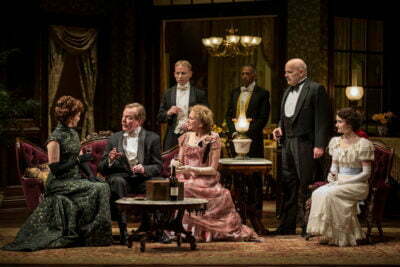
The three middle-aged Hubbard siblings, scheming business mastermind Ben (Larry Yando), emotionally manipulative Regina (Shannon Cochran), and angry moron Oscar (Steve Pickering), are by the South’s standards, new money. They’ve done alright for themselves so far, as evidenced by the dark, oily mansion Regina lives in (set designer Todd Rosenthal) and Oscar’s marriage to Birdie (Mary Beth Fisher), an aristocrat whose family has fallen on hard times. But now, in the form of Chicago investor William Marshall (Michael Canavan), they have an opportunity to become rich beyond their dreams. Marshall is proposing to invest with them in the construction of an industrial cotton mill, the first of its kind in these much less union-friendly parts. The two brothers and Regina, through her husband Horace Giddens, will retain 51% of the shares, ensuring control remains within the family, and the three will split the costs and shares evenly.
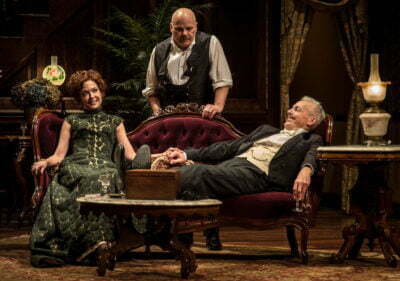
Co-operation is not this family’s strong suit, however. Regina’s husband Horace (John Judd) isn’t actually present at his house on the night of the celebratory meal. Indeed, Horace has not been home in months, since he is hospitalized in Baltimore with a heart condition, and nobody’s heard from him in a while. Since Marshall’s deadline is approaching, Ben and Oscar are concerned, and Regina proposes an alternate arrangement. Since they are so eager on control remaining in the family, why not grant her and Horace a larger share, if they want her to prod him into sending the money faster? The brothers are not happy about that, but agree to compensate Oscar for his loss in shares by ensuring his legacy. Oscar and Birdie have a son, Leo (Dan Waller), who “works” at the bank. Leo will marry Regina and Horace’s daughter Alexandra, called Zan (Rae Gray), reuniting the shares in the future. Oscar accepts, and Regina sends Zan to pick up her father.
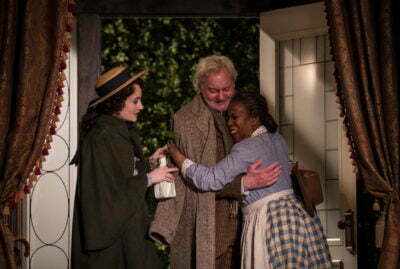
Zan, Horace, and Birdie are far better people than the scheming Hubbards, and are determined to escape their clutches. While the marriage plot is thwarted rather easily, Ben soon points out to Leo an alternate way of securing the money, and the intrigues reignite. But the specifics of Ben and Regina’s backstabbing aren’t as important as the atmosphere. Horace’s ailments worsen from travel and the stress of living amid such acrimony. John Judd plays him as a man whose convictions are no less fiery for being somewhat newly found, and were he healthier, would be more than a match for his wife and in-laws. But he has a soft spot for his daughter, and for his loyal servant Addie, whom Cherene Snow plays as kindly-disposed, but resigned to helplessness. Her and Zan’s awakening to action is the greatest character development in the play, though they are helped along by Mary Beth Fisher as Birdie’s pitiful revelation of the heartache beneath her alcohol-induced bubbliness.
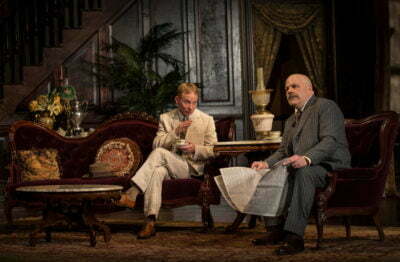
But really, this is a play that belongs to its villains. Dan Waller’s Leo exudes sleaziness and unthinking entitlement, while Steve Pickering’s Oscar, a man who amuses himself by shooting animals but refuses to let anyone eat them, is a perpetually aggrieved bully. Larry Yando as Ben takes such pleasure in all the cruel things he does and says that when he spent a moment just to sit on the couch and cackle, it felt well-deserved. Shannon Cochran’s domineering Regina is the most developed of the siblings. Although lacking any apparent human connections, she longs for attention from the crowds of Chicago, and fantasizes about all the fine Parisian clothes she’ll wear in high society. Though it is delightful to watch her push her brothers around, the part of the show the audience I was with responded to most favorably was her meltdown at the end of Act Two. Hellman had a flair for humiliating the haughty, and the Hubbard family is a regular source of dark comedy.
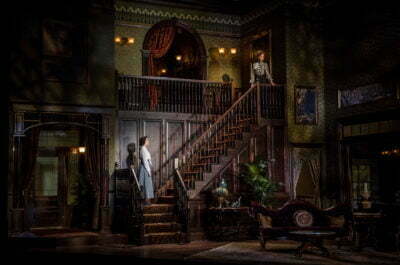
Richard Woodbury’s sound design makes the show literally melodramatic, and it’s best appreciated with the expectation of such. The musical build-up to the first time Oscar hits Birdie seemed a little hokey to me at first, but I came to accept moments like that as a part of the Hubbard world. A serious investigation into the labor conditions in the South circa 1900 would not have been fun, but a slight unreality is what makes this piece enjoyable, since it supplies outrage as a form of recreation (and a call to action). Wishcamper understood this, and was able to get his actors to the perfect point where they could portray extreme characters without going over the top. With the Goodman’s high production values, Rosenthal’s detailed set design and Jenny Mannis’s costumes risked hypocrisy in making the Hubbard world beautiful, but instead, there is an ever-present darkness in the rooms, and symbolic significance in the contrast between the Zan and her mother’s way of dressing. Hellman and Wishcamper play with what is visible onstage and what happens just off, enlarging the dramatic world beyond its physical confines. But the psychological webs the characters spin ensure themselves a place in the minds of each other, and the audience, long after the lights go down.
Highly Recommended
Jacob Davis
[email protected]
Reviewed May 11, 2015
This show has been Jeff recommended.
For more information, listen to Tom Williams’s interview with Steve Pickering, and see The Little Foxes’ page on Theatre in Chicago.
Playing at the Goodman Theatre, 170 N Dearborn, Chicago. Tickets are $25-81; or order, call 312-443-3800 or visit GoodmanTheatre.org. Plays May 26 at 7:30 pm, Wednesdays at 7:30 pm, Thursdays at 2:00 pm (except May 14) and 7:30 pm, Fridays at 8:00 pm, Saturdays at 2:00 pm (starting May 23) and 8:00 pm, Sundays at 2:00 pm and 7:30 pm on May 17 and the closing performance on June 6. Running time is three hours, with two intermissions.

